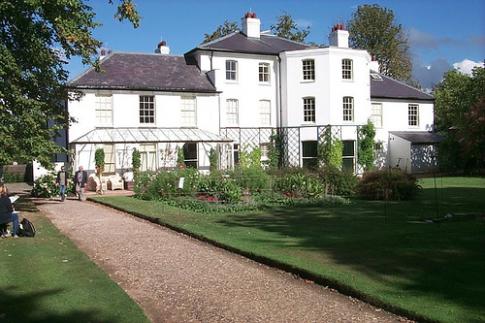Darwin's home nominated as world heritage site

Downe Bank, at the site, is a beautiful piece of chalk downland which in spring bears cowslips, wild violets, orchids and primroses.
Maev Kennedy
To celebrate the 200th anniversary of the birth of the scientist who changed the world, the government will today nominate Charles Darwin's home in Kent, and the nearby woodlands, fields and ponds that have been called his landscape laboratory, as a world heritage site.
The designation, if accepted, will place Down House, the home where Darwin wrote On The Origin Of Species - in his study with an angled mirror to check for unwelcome visitors at the front door - beside the Pyramids and Stonehenge in the world's treasury of monuments to human genius.
His great-great-grandson Randall Keynes said yesterday that the designation was urgently needed to preserve a unique landscape from creeping suburbanisation.
The heritage site, near the village of Downe, would encompass the banks where Darwin gathered wild orchids to propagate and study in his glasshouses, the bog where he drew tiny insect-eating plants, and the pond where he collected mud to see what seeds would sprout.
"What is remarkable is the extent to which we can still walk in Darwin's footsteps, out from his own garden into the fields and woodlands which inspired him," said Keynes yesterday. "In a field where he recorded 13 species of orchid, we were still able to find 12. This is a landscape of small, secret, precious places, and you have to get out there into the fields, get your nose right down into the grass - and you will still see exactly what Darwin saw."
The culture secretary, Andy Burnham, who will today formally propose Darwin's landscape as Britain's only nomination this year for World Heritage status, said it was essential to have a list wider than outstanding landscapes such as the Grand Canyon. "The World Heritage Committee called for nominations to recognise and celebrate outstanding achievements of science, and Darwin's landscape laboratory nomination does just this."
Downe Bank, at the site, is a beautiful piece of chalk downland which in spring bears cowslips, wild violets, orchids and primroses. Now part of a nature reserve, it inspired the famous last passage in the Origin: "It is interesting to contemplate an entangled bank, clothed with plants of many kinds, with birds singing in the buses, with various insects flitting about and with worms crawling through the damp earth, and to reflect that these elaborately constructed forms, so different from each other, and so dependent on each other in so complex a manner, have all been produced by laws acting around us. This planet has gone cycling on according to the fixed law of gravity, and from so simple a beginning endless forms most beautiful, and most wonderful, have been and are being evolved."
The nomination has been carefully formulated following disappointment two years ago when a version was withdraw after the government saw it would probably be rejected since the advisers to the Unesco council, which administers the list, were not convinced the site was of genuine scientific importance. The "landscape laboratory" description has been coined to help further efforts by the nomination group, which is led by Bromley council, working with the property's owner, English Heritage, as well as scientists, environmental experts and Keynes.
Darwin spent decades building on the observations rooted in his five-year voyage on HMS Beagle, which included the visit to the Galapagos and led him to the conclusion that plants and animals were the outcome of the natural selection of advantageous characteristics. He knew his work would mean confrontation with creationists.
Having moved to Down House in 1842 he rarely left for longer than a few days. He died in 1882. He had chosen the spot precisely for its wealth of wildlife habitat: "We are absolutely at the verge of the world," he wrote to his sister. Today Down's survival, preserved after the second world war by the introduction of the green belt, which stopped the march of the suburbs only a few miles north, is little short of a miracle.




 del.icio.us
del.icio.us Digg
Digg

Post your comment